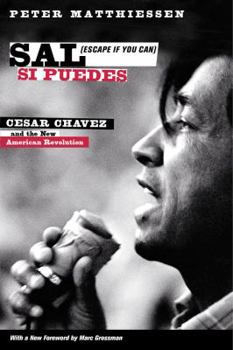Sal Si Puedes (Escape If You Can): Cesar Chavez and the New American Revolution
Select Format
Select Condition 
Book Overview
In the summer of 1968 Peter Matthiessen met Cesar Chavez for the first time. They were the same age: forty-one. Matthiessen lived in New York City, while Chavez lived in the Central Valley farm town of Delano, where the grape strike was unfolding. This book is Matthiessen's panoramic yet finely detailed account of the three years he spent working and traveling with Chavez, including to Sal Si Puedes, the San Jose barrio where Chavez began his organizing. Matthiessen provides a candid look into the many sides of this enigmatic and charismatic leader who lived by the laws of nonviolence. Sal Si Puedes is less reportage than living history. In its pages a whole era comes alive: the Chicano, Black Power, and antiwar movements; the browning of the labor movement; Chavez's fasts; the nationwide boycott of California grapes. When Chavez died in 1993, tens of thousands gathered at his funeral. It was a clear sign of how beloved he was and how important his life had been. A new foreword by Marc Grossman considers the significance of Chavez's legacy for our time. As well as serving as an indispensable guide to the 1960s, this book rejuvenates the extraordinary vitality of Chavez's life and spirit, giving his message a renewed and much-needed urgency.
Format:Paperback
Language:English
ISBN:0520282507
ISBN13:9780520282506
Release Date:March 2014
Publisher:University of California Press
Length:416 Pages
Weight:1.05 lbs.
Dimensions:1.0" x 6.0" x 9.0"
Customer Reviews
2 ratings
Do you really want to escape?
Published by Thriftbooks.com User , 20 years ago
Sal Si Puedes, by Peter Matthiessen, is an excellent chronicle of the adult life of the farm workers' revolutionary, Cesar Chavez. This Biography written by Matthiessen is from the day he meets Chavez to the time he passed away in 1992. Chavez was a activist for the rights of all farm workers, and believed that union representation was not only a privilege, but a right of all workers. With the installment of the Bracero program, non American people brought into the united states were allowed to work in the fields, because Lobbyists in Washington were successfully able to determine that no American was willing to do the back breaking manual labor of picking and harvesting the fields in California. This book was simply put, is the best book that I have read in my young adult life. One thing that I enjoyed in this biography is the use of language. I found the linguistics easy to understand. With the easy language and prose writing, this made the biography an easy read. Because I spent a short time of my later childhood in Delano, Where the book took place, I knew exactly where everything was, and with his descriptive, powerful words, I felt like I was back in Delano. Stepping out of my own skin and looking at the book from a non-Californian's perspective, the description and detail is awesome. Another thing I liked about the book was the accuracy of the historical fact. Family members of mine lived in the time of the farm workers movement, and after having discussed the biography with them, they, too, agree that the accuracy and detail of events that took place are superior. The chronicling of not only the personal life, but also business life of Chavez was easily understood, and Matthiessen did an excellent job with this Biography.
Sal Si Puedes means Escape If You Can
Published by Thriftbooks.com User , 23 years ago
Am forever indebted to my mentor Bea Brickey for getting me involved with the United Farm Worker union locally, and for instilling in me the importance of getting involved and living by Christ's motto that what you do to the least of them you do to Christ.The book begins with a reminder form Cesar Chavez himself, who said in 1992 two years before his death that "The rich have money, the poor have time". The reader is reminded that patience was his tool of success. The book is just shy of 400 pages and is a humbling as well as an energizing read. The title Sal Si Puedes is from the San Jose barrio where Chavez' farm workers union work was birthed. The book was begun with a three year stint the author had in the late 70's with Chavez with much appreciated postscript that brings the reader up to date with the events that incurred since the 60's and 70's. Bea would spend hours passing on the wisdom that Chavez and the other UFW activists had taught her. How she and her husband were often taunted by San Joaquin farmers and called commies and pinkos and how Chavez and the other UFW workers who simply wanted decent working conditions and a living wage were taunted like this as well. How migrant workers were/are exposed to high pesticide levels and that in one breath the farmers denounce the "slave" labour workers for wanting decent housing and wages, while bemoaning the fact that they can't find American who will do the damn stoop labour for slave wages.This is a book I am passing on to a lot of people, since I believe it is so important that we as citizens, stand up for what is right and that sometimes people have to have their comfort levels challenged.






